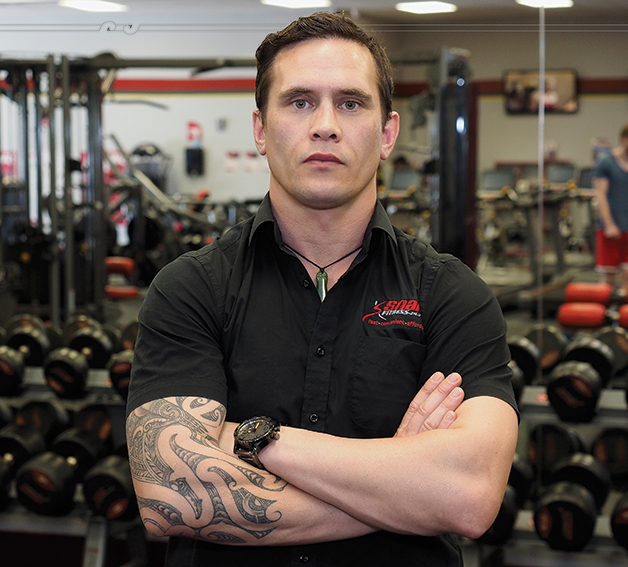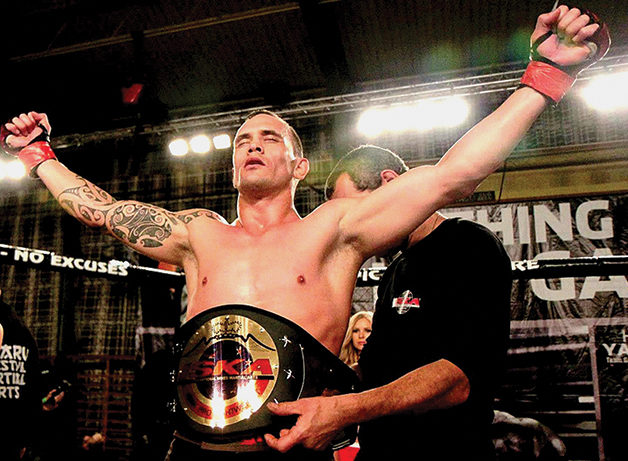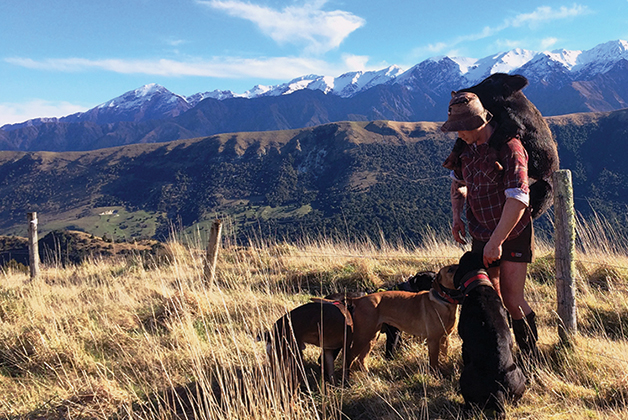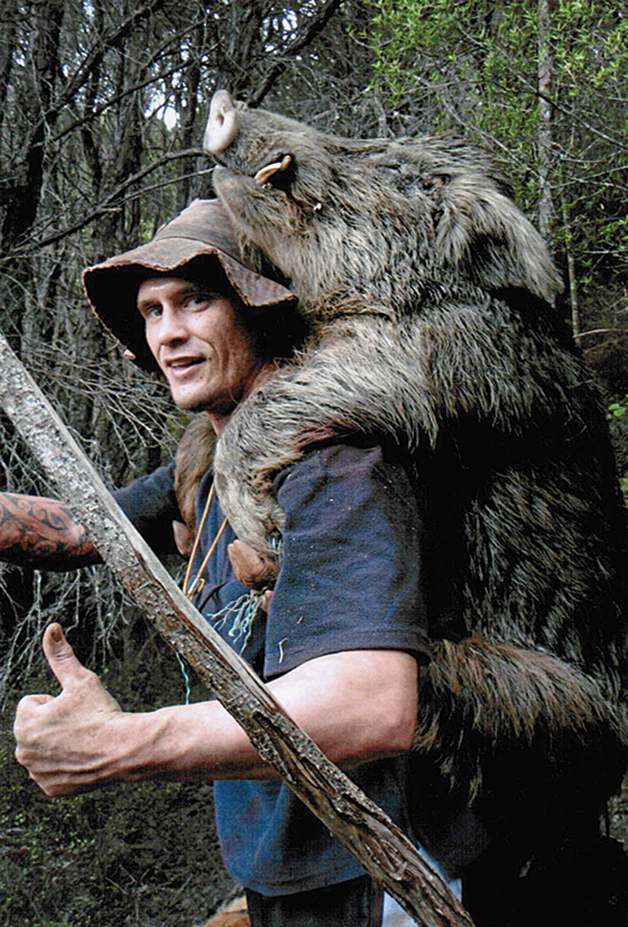In a league of his own
Oct 10, 2014

Korey Gibson has the same full contact approach to business that made him excel as a rugby league player and mixed martial arts fighter.
Kaituhi Brent Melville does his best to keep up.

Korey Gibson has just taken delivery of an InBody composition scanner from Australia, a machine you stand on to measure your body’s water content, percentage of body fat, bone mineral content, protein content, and visceral fat levels – all in about a minute.
Pretty cool, but at a price tag of $27,000, not something you’d find in your average home. Korey considers it a necessary tool of trade for his fast-expanding network of health clubs.
He’s come a long way from Carisbrooke Street, Aranui; the Avoca Street Flats, Kaikōura; and Veronica Place in Bell Block, New Plymouth; but has never lost sight of his roots.
With a natural physicality, unflagging energy, and hunger to win at all costs, Korey, 37, first represented his country in international rugby league at age 18. A few years later, he successfully fought for two Australian and the New Zealand lightweight mixed martial arts (MMA) titles.
In leveraging his passion for physical fitness, Korey has acquired the New Zealand area development (franchisor) rights to the fast-growing Snap Fitness 24/7 health club chain, and holds joint ownership in 14 of the 38 gyms currently open around the country.
Korey spent his formative years in Taranaki, though he was born in Christchurch. His whakapapa includes Kāi Tahu (Wairewa, Ōnuku, Waihōpai, Ōraka-Aparima, Awarua), Ngāti Huia o Ngāti Raukawa ki te tonga and Ngāti Tama. Deeply proud of his Māoritanga, one of his major goals is to speak fluently in te reo and he is blessed to have inspiring kaiako in his life who are helping him every week. He has also spent time learning the art of mau rākau (taiaha).
His earliest memories were of living at his grandfather’s house in Aranui. After moving to Kaikōura for a couple of years, the family headed to Taranaki where Korey’s dad had found work in the fisheries. “We lived first at my Nana’s in Drake Street before securing government housing at Veronica Place. It was the toughest yet most influential street in Bell Block, though I really loved it there. I guess tough neighbourhoods become the norm if that’s what you’re used to,” he says.
Both Korey and his brother Rickie picked up their love for rugby league at that time. “We played Union initially but switched to league because it was a more physical game. Not being able to tackle properly with the introduction of ‘new image’ rugby or simply touching a boy on the hips made no sense to me, though it made it easier to score tries,” he laughs.
And score tries he did. By the age of 10 he was playing for the Bell Block Marist Dragons in the under 13 league and went on to make every Taranaki rep team for league and touch footy. Ultimately this led to his first international experience, a scholarship with the Illawarra Steelers in Sydney in 1995.
One of Korey’s proudest moments was as a New Zealand Secondary Schools player in 1995 where he marked State of Origin player Ben Ikin, and as captain in 1996 at age 18. His only regret in rugby league was not being picked for the junior New Zealand Māori Rugby League team. “I heard afterwards that the selectors didn’t know I was Māori, which was sad as I think I could’ve made a real contribution.”
At age 17 he’d also already signed with the Auckland Warriors, which meant a move out of his parents’ house.
“It was exciting but it was also tough,” he says. “I wasn’t just leaving my family, I was leaving my bros and in a sense, my childhood.”
The move also effectively ended his formal schooling. In Auckland he went to work as a labourer, up at 5 am, working until 4 pm, and then to league training.
He was still a teenager but even at that stage, he was considered the fittest man in the Warriors. “The hierarchy wanted my coach to make me repeat the tests, but my coach said that those were my results and I wasn’t going to repeat the trials.”
For the next two years Korey thought he was unbeatable, until he was diagnosed with cancer at the age of 19. “I grew up fast. It was scary, it made me realise I wasn’t invincible. But I never doubted that I would beat it,” he says.
It took surgery and nine years of check-ups but Korey was eventually given the all clear, a process which he believes gave him inner strength. “It made me want to expand my horizons and it also helped shape my perception of people. To ensure I achieve something while I’m here, have something to leave for my children and family, and leave the planet in a better state than when I arrived; but most of all to keep the people around me who I love the most.”
In 1998 Korey left the Warriors and was contracted to play league in England. As with many young people with a bit of money in their pocket, he had no trouble spending his hard-won earnings. While he continued to train hard and enjoy the professional lifestyle, the game started taking a huge physical toll on his body. These were significant injuries, including spinal fractures, two broken ankles, a torn quadriceps, a dislocated shoulder, damaged rib cartilage, and a cracked sternum.
Despite the numerous injuries, in 1999 Korey signed with the South Brisbane Magpies. He lasted two more seasons before quitting rugby league altogether in 2001. “League was never about the money. It was about playing with my boys, my brothers. And the game had become too regimented. I didn’t want to play with too many team patterns and structure.”
He’d arrived in Australia with $50 to his name. “Part of that actually went to buying dog food for a dog that my younger brother Rickie had given me.” He needed to put his own food on the table, buy furniture, and get a place to live. His first job was washing cars at a Brisbane car dealership, a job he did for 18 months. When a job came up selling gym memberships for Healthland Fitness International, he jumped at it. Roles with Allsports Lifestyle Clubs, Fitness First, Sports Motion Wynnum and Bardon Health Club followed.
Korey had found his niche.
He sold gym memberships during the day and studied personal training and business management at night. He opened his first personal training business in 2002, and two years later started an outdoor group exercise company called Boot Camps Australia with one Australian business partner. Within six years they’d expanded the business to more than 50 sites throughout Australia.
During that time Korey had a brief flutter with boxing, winning his first two amateur bouts, but his work commitments were taking more and more of his time, so boxing was shelved. Two years later he started training with Danny Higgins of Integrated Mixed Martial Arts and his first MMA fight followed in October 2006. Since then he’s won two Australian lightweight belts and the New Zealand belt in 2013, with his New Zealand team coached by Karl Webber at Strikeforce in Christchurch. “I might fight again next year but I think this might be my last one, as my body’s taken a fair bit of battering with a further three surgeries in the last 10 months, with one or two more on the cards soon.”
After selling Boot Camps Australia in 2010 to a former franchisee, Korey returned to New Zealand in 2008 with a vision to help New Zealanders, and in particular Māori youth, to adopt healthier lifestyles.
Not one to shy away from risk, he took on massive debt to build Quest Health Club in Ferrymead. “The original building was really just a warehouse. I bought a table and did interviews from a nearby café, hiring five staff who had to undertake two weeks unpaid training, ‘cause I couldn’t afford to pay them at that stage,” he laughs.
“I knew that building the gym, at an investment of almost $4 million, was a risk; but we managed it, launching with 943 members, which was kind of disappointing at the time as I wanted to start off with 1,000 members.” It didn’t take long for Korey to get to his target of 2,500 members, returning $600,000 profit annually and only a projected six to eight months away from returning the magic million dollar annual profit.
Everything changed on 22 February 2011.
“I was actually in the gym training about eight staff when the February earthquake hit. We all dived for cover and the building took a massive hit – there was liquefaction almost immediately and when you consider the type of machines and gear you have in a gym, we were really lucky nobody was seriously injured or worse.”
When the full impact of the disaster became apparent, Korey and his team went back to the gym, grabbing stuff like protein bars and shakes and delivering these to locals. “The community had taken a huge blow, and in our view, every little bit helped to get us back on our feet.”
It took 15 months of negotiation to sort a settlement with his insurers, though it didn’t stop him going into the office every day. “We had no insulation, holes in the walls, and my office was wrapped in cellophane – not exactly ideal conditions to run a business,” says Korey. His temporary solution was to buy a nearby physio practice, where he and his staff worked for nine months.
[Korey is] dedicated to helping Māori youth. “If your body is healthy and your mind is healthy, it’s hard not to be successful in what you choose to do.”
In the meantime his Australian business partners had come to Korey with the idea of rolling out the Snap Fitness 24/7 chain in New Zealand. “It was an innovative concept out of the US – 24/7 gyms with state-of-the-art equipment, minimal staffing, and no long-term commitments. Young people in particular are scared of long-term contracts, yet our average stay is nine to 12 months and we’re comfortable with that.”
Snap started with one club in Papanui, and Korey and his partners have expanded the fitness franchise quickly over the past four years. Today, Snap has 38 franchises around the country and there are another seven due to open by the end of this year.
Korey believes health clubs and fitness centres also have an important role to play in the rebuild of Christchurch. “I think that keeping physically fit, having fun, and burning off steam and frustration can be an important part of the recovery.”
Fun is one thing, of course, and he loves getting up and going to work, but Korey hasn’t lost his competitive edge. For example, he’s the undisputed table tennis champion at the gym. “I’ve started playing with my left hand, just to keep it interesting,” he boasts.
He remains dedicated to helping Māori youth. “I think a lot of our younger people don’t know where they are heading. It’s not just about setting goals for the sake of setting goals. Lifestyle and career balance often comes down to little choices. If your body is healthy and your mind is healthy, it’s hard not to be successful in what you choose to do.”
Just up the hill from the gym in Redcliffs is Korey and partner Tessa’s modern house. With an impressive view of the city and Pegasus Bay, it is full of Korey’s pictures, trophies and belts – reminders of his remarkable career both on the league field and in the MMA cage.
He has a staggering number of projects on the go, including the establishment of a learning institute for personal trainers, the Fit Futures Learning Institute, which will launch next year. The free time that he does have is generally spent with friends and family, more often than
not at his second home in Mangamaunu, Kaikōura, where he enjoys studying New Zealand history, researching his whakapapa, diving with dad Mike, or hunting wild pigs with his mates Hayden Dreaver, Stump, and Corrie Adams, and their dogs.
“Aotearoa is blessed with natural resources, fertile oceans, and land. We need to protect and nurture that, and also ensure that our future generations are able to do so. Those are two things I would truly fight for.”
“I’ve always loved the New Zealand bush, enjoyed diving and giving kaimoana to elders, preparing a hāngī or cooking pāua in rimurapa (bull kelp) the traditional way. I also head up to Taranaki as much as possible to visit my mum, Aroha, and Tessa’s family (also from Taranaki); and a few times each year I head to Brisbane to catch up with friends and spend time with my nephew Tahi.”
Korey hopes to spread his love of the outdoors by purchasing a hunting block in the near future. Here he plans to establish a wildlife sanctuary and help street kids experience the bush and our unique wildlife by staying in huts and hunting, preparing, and cooking food in traditional ways.
“Aotearoa is blessed with natural resources, fertile oceans, and land. We need to protect and nurture that, and also ensure that our future generations are able to do so. Those are two things I would truly fight for.”


